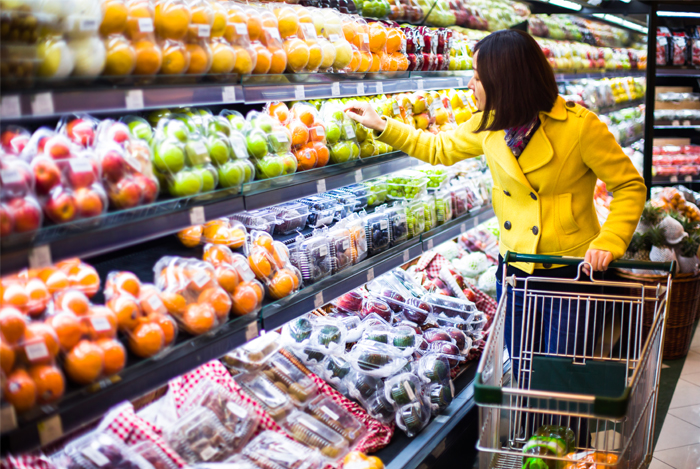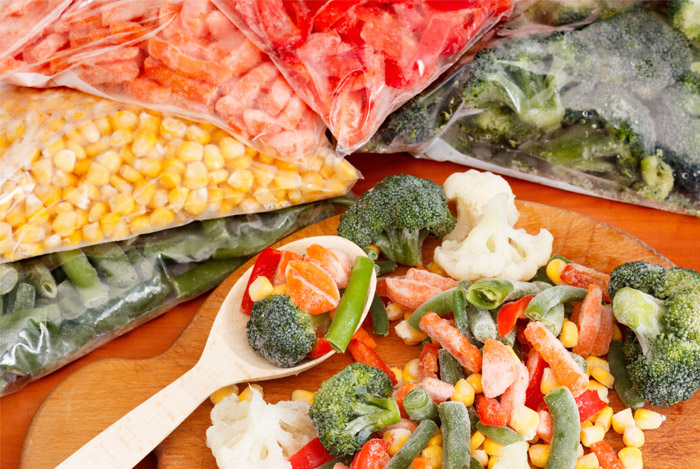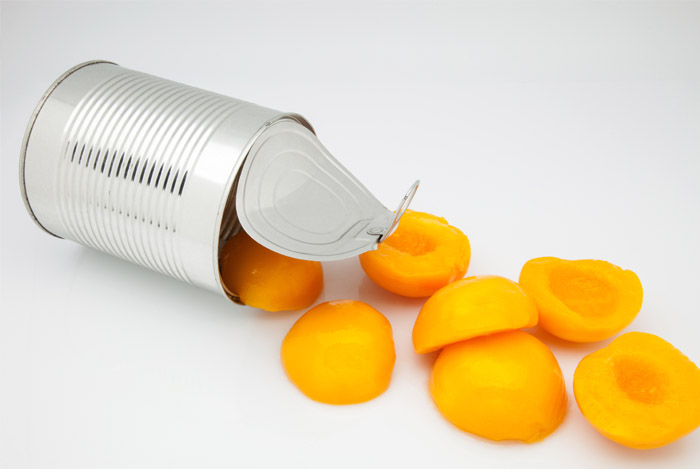We know that good nutrition keeps us from getting sick, but it seems like we’ve been asking this question for decades: What’s healthier for you, canned, fresh, or frozen produce?
The problem is that the answer typically depends entirely on who you ask.
If you asked your grandmother, she’d probably tell you that canned veggies last a long time and taste just as delicious as fresh produce because during times of economic depressions and wars, she relied on cheaper canned produce so she could feed everyone healthy foods on a budget.
If you asked your mother the same question, she’d probably say that frozen produce is way more convenient because she worked full time and frozen foods gave her the biggest bang for her buck in the shortest amount of cooking time.
Millennials today may have an entirely different opinion; they’ll probably say that fresh produce is always the best option.
By the time they started cooking on their own, the farm-to-table movement was already in full swing, attracting supporters who believe that fresh, local produce that travels the shortest distance to the table is the healthiest kind you can eat.
So what if I told you that all three of these opinions are correct?
The United States Department of Agriculture (USDA) says we should be eating 2 cups of fruit and 2.5–3 cups of veggies per day.
But here are some surprising statistics that may shock you:
- The average American eats only 43% of the recommended fruit intake per day and just 57% of the recommended intake of veggies.
- Just 1% of adults and 2% of kids meet both their fruit and veggie requirements for the day.
- “Average food spending in the United States has been estimated at around 11% of income”, but “households in poverty can spend more than 25%”.
Judging by these statistics, it seems that we all need to bump up our produce game.
But what if you couldn’t afford to buy expensive produce? Would you be forced to turn to deadly processed foods or subject your body to the horrible ingredients in fast food?
Maybe we’re not eating enough produce because there’s too much confusion (and maybe even stigma) that cheaper canned and frozen produce isn’t as healthy as fresh produce.
So today we’re going to take a scientific approach to answer this question and analyze the pros and cons of each source.
Fresh Fruits and Veggies are Not Perfect

Don’t get me wrong, fresh produce is healthy, beautiful, and delicious when eaten seasonally. But it’s a common misconception that fresh produce is always the healthiest option.
Nutritionally speaking, there are lots of factors that go into the health of your produce.
We know that produce is regional and seasonal; this means you’re not going to find oranges growing in the dead of winter in Alaska or winter squash flourishing in the hot tropical weather of south Florida.
However, since our economy has become so global and our patience for waiting for seasonal produce has been shrinking, the supply for year-round produce has been in demand. This means we get to enjoy the refreshing health benefits of watermelon all year long, even though it’s typically a summer fruit.
“It is estimated that much of the food consumed in the United States travels an average of 1,500 miles from the farm to your kitchen table”.
During your produce’s journey, your fruits and veggies are exposed to extreme temperature and light conditions, from hot warehouses to cold trucks, which may cause important nutrients to degrade before you even purchase your food.
It typically takes an average of 10–14 days for your food to get from the farm to your fork. The longer your fresh produce travels, the more nutrients get oxidized and lost.
According to a study published in the Journal of the Science of Food and Agriculture:
“Vegetables can lose 15 to 55 percent of vitamin C, for instance, within a week. Some spinach can lose 90 percent within the first 24 hours after harvest”.
Ever buy a delicious smelling fruit only to see it start molding within a few hours?
“Plants continue to ‘breathe in’ oxygen for a few days after being picked”, but the “oxygen speeds the rotting process”.
If your produce is picked on day one, but it takes eight days to travel to you, and then another two days to sit in the grocery store before you purchase it, even if you eat it the same day you buy it, your supposedly fresh produce has already been ‘dying’ for close to two weeks!
To combat this issue, many produce companies pick their fruits and veggies before they’re actually ripe so they have more time during transit.
They may look the same as ripe produce, but if that produce is unable to reach its peak ripeness it won’t have the same vitamins, nutrients, or nutritional composition as produce that’s allowed to fully develop its nutritional potency.
Plus, because fresh produce is so perishable, it needs to be shipped constantly, which means more frequent and expedited shipments that cost the growers money. This cost gets passed on to you, the consumer.
“Fresh fruits and vegetables don’t taste as good when you consume them out of season and they can be much more expensive”, says Brenda Roche Wolford, M.S., R.D.
In fact, “when primary shoppers were asked what factors made it most difficult for them to include more fruits and vegetables in meals and snacks, cost was among the highest concerns…44% said fruit was too expensive and 35% said vegetables were too expensive”.
So instead of buying all of your produce fresh, stick to a few staples and save money by going frozen or canned for others.
What to buy fresh:
- Local and seasonal produce for the best flavor at the least expensive price.
- Produce rich in B and C vitamins since these vitamins are water-soluble, sensitive to heat and light, and go through significant losses during blanching.
Don’t Give Frozen Produce the Cold Shoulder
 A more economical choice for those needing to stock their home with produce staples is taking a walk down the freezer aisles in your grocery store.
A more economical choice for those needing to stock their home with produce staples is taking a walk down the freezer aisles in your grocery store.
When produce is grown to be shipped and sold as frozen, it’s picked at its peak ripeness directly from the fields where it grows and sent to a processor very close by.
The fresh produce is either blanched, which means it’s cooked for a very short time in boiling water, or steamed, before being frozen.
As you may recall, steaming and blanching are some of the best ways to maximize the nutritional benefits of your food.
Once the produce is minimally cooked, freezing locks in all the vitamins, minerals, and antioxidants so it’s ready to be shipped.
All of this happens within a few hours (at most) of being picked, which is important because the sooner produce is picked and preserved, the more nutrients it retains.
The frozen produce is then stored until a large shipment can be sent out for delivery. It doesn’t have to be expedited because it will perish; it just needs to stay frozen. This also minimizes the varying temperature and light changes that fresh produce goes through.
“Vegetables that are frozen right after harvesting may actually contain more of their original nutritional content than vegetables that endure cross-country transportation and a long period of storage before they reach your table”.
Plus, frozen produce makes it easy to plan recipes regardless of what the produce at the market looks like. You can keep staples on hand in case you don’t have time to buy fresh produce and you’ll never waste another fresh fruit or veggie again.
What to buy frozen:
- Spinach delivers more product in less volume when frozen. One cup of frozen spinach has more than four times the amount of fiber, folate, iron, and calcium, than a cup of fresh spinach.
- Peas tout higher beta-carotene levels when frozen. When they’re picked, their sugars turn to starch and after 24 hours, they get grainy and dull-tasting. Frozen peas are picked and frozen fast, halting the process and resulting in sweet peas.
- Fruit such as blueberries, raspberries, cherries, and peaches all make great additions to smoothies or oatmeal and will always be cheaper than fresh out of season.
What’s in Canned Produce?
 The most economical way to add more produce to your diet is by stocking up on canned, boxed, or bottled produce.
The most economical way to add more produce to your diet is by stocking up on canned, boxed, or bottled produce.
“Cost analyses have shown that canned vegetables can be as low as one-fifth the price of fresh options, and half the cost of frozen”.
When produce goes through the canning process, it’s picked at just the right time to ensure optimal ripeness levels so nutrients are at their highest. Produce also doesn’t wait around very long so the nutrients have less time to degrade before they’re preserved.
Canned produce sometimes compromises vitamins B and C because these vitamins are sensitive to heat and canning requires high temperatures. This means vitamins B and C are drawn out from the produce and into the canning water.
On the bright side, other veggies actually need to be cooked in order to release their maximum health benefits. So they may actually have higher levels of healthy antioxidants than fresh veggies.
Researcher Steven Miller says:
“Canned fruits and vegetables provide high quality nutrition to Americans regardless of income level and geography. By increasing accessibility to key nutrients many Americans need, canned foods are a year-round solution to help families prepare healthier, balanced meals”.
Just be careful: some companies use salt to preserve the flavor of fresh veggies and prevent them from spoiling after they’re shipped. High intake of dietary sodium can lead to high blood pressure and raises your risk of heart disease.
You’ll need to be diligent when checking the labels of your canned produce. Buy cans that specifically say “no salt added” on the label.
You may see “low sodium” or “reduced sodium” printed on some cans, but that typically means that food has crazy high sodium levels. Rinse off your canned veggies before you use them to wash off up to half of the salt.
Canned fruits are often packed in heavy syrup that contains added sugar. Try to stick to fruit packed in water for the healthiest choice.
Canned fruits and veggies can last up to two years with proper storage thanks to their sealed-in, oxygen-free can. But once a can starts bulging or becomes dented, you should definitely toss it.
You may be wondering if canned and bottled produce is even safe. Don’t they contain bisphenol A, or BPA?
BPA has the ability to leach into food, and in large doses, it can “act as the hormone estrogen and may be linked with an increased risk of some cancers”.
Research hasn’t been conclusive about the risks of BPA, but if you want to avoid it, just buy your canned veggies in BPA free containers (which are labeled as such) or look for glass jars and aseptic boxes.
What to buy canned:
- Tomatoes deliver more B vitamins as well as lycopene, a carotene loosely tied to a lowered cancer risk, when canned. Fresh tomatoes need to be cooked to release beta-carotene and lycopene, antioxidants.
- Beans may cost more in the can, but they’re already soaked, ready to eat, and just as nutritional as dried beans.
Final Notes
 Unless you’re buying from a local farmer or growing your own produce, your fresh fruits and veggies may not be as healthy as you think they are.
Unless you’re buying from a local farmer or growing your own produce, your fresh fruits and veggies may not be as healthy as you think they are.
Try to supplement your fresh produce with unseasoned cans and frozen bags of fruits and veggies and season them yourself during preparation. This guarantees that you’ll be able to control the amount of salt and sugar in your meal.
Stay away from canned or frozen veggies that come with sauce. You never want butter, cream, sugar, or cheese to taint the healthiness of your produce.
There’s one thing we can all agree on: eating more produce is the key to eating well, feeling great, and looking even better. If buying less expensive canned or frozen fruits and vegetables increases your intake, it’s a positive step in the right direction.
Which foods do you prefer fresh, frozen, or canned? I always have a bag of mixed berries in my freezer. Share your picks with me in the comments!
The post Canned, Fresh or Frozen Foods – Which is Best? appeared first on Nutrition Secrets.
http://www.nutritionsecrets.com/canned-fresh-or-frozen-foods-which-is-best/
No comments:
Post a Comment